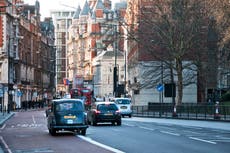‘Piece of spin’: Cyclists hit back at claim new lanes to blame for London becoming world’s most congested city
Segregated spaces for cycling are one of the reasons drivers will lose an average of 148 hours stuck in jams across 2021, according to new analysis

An increase in cycle lanes during the coronavirus pandemic has been blamed for London becoming the world’s most congested city.
Segregated spaces for cycling are one of the reasons drivers in the capital will lose an average of 148 hours stuck in jams across the whole of 2021, traffic information supplier Inrix has claimed.
This is down just one per cent on pre-coronavirus pandemic levels, which is a much smaller decline than many other major cities across the globe.
Peter Lees, Inrix operations director, said the installation of cycle lanes had a “negative impact on congestion”, after London was ranked only the 16th most congested city last year.
However cycling groups have hit back, arguing the claim is “a piece of spin” and that it is “incredibly simplistic” to blame new cycle lanes for causing congestion.
New cycle lanes were installed in the capital last year following the coronavirus outbreak to encourage active travel.
Several councils reversed the schemes following vocal opposition by motorists who claimed they caused delays, but some of the lanes remain in place.
Mr Lees said: “Use of roads is all about supply and demand. If the demand goes up but the road space is being shared with other forms of transport, there’s less tarmac effectively for the cars to be on, which then has an impact on the speeds on the road and therefore congestion.”
But Simon Munk, campaigns manager at London Cycling Campaign, branded the analysis “pure speculation”.
He told The Independent: “The simple truth is that the Inrix report, regardless of the data, doesn’t even talk about cycle tracks so this is a piece of spin that has been added after the fact.
“We’ve got cycle tracks on less than one per cent of London’s roads – the idea that cycle tracks are somehow causing chaos when actually we know from the traffic data that where there’s cycle tracks there’s not huge amounts of congestion.
“Often we are seeing motor traffic volumes are at 100 per cent pre lockdown numbers or above, so it is just pure speculation, it looks like, on one person’s part and has no credibility at all.
“We know from international studies, from decades of experience, the idea that you can somehow by freeing up tarmac solve congestion just doesn’t play out that way at all. If you build more roads, you get more cars.
“We are a complex, often mediaevally-planned city, and so if we want less congestion we have to build alternatives, not for more cars.”
Duncan Dollimore, head of campaigns at charity Cycling UK, added: “It’s incredibly simplistic for Inrix to suggest that the use of road is all about supply and demand, without considering how efficiently that road space is used.
“On Blackfriars Bridge, cycle lanes take up 20 per cent of the road space but move 70 per cent of the people across it at peak times, with cycle lanes across London moving more people more efficiently in less space.
“Inrix are focussed on the tarmac available for cars, when the question should be how we use and allocate that space better, changing travel behaviours and reducing congestion in the process.”
Mr Lees said the main reason for London’s surge in the traffic jam ranking was its relatively strong economic recovery from the pandemic compared with other global cities.
In 2021, Paris was in second place in the global ranking for most congestion (140 hours lost), followed by Brussels (134 hours lost), Moscow (108 hours lost) and New York (102 hours lost).
Across the UK as a whole, drivers will waste an average of 73 hours in traffic this year.
That is up 36 hours from 2020, but down 42 hours compared with pre-Covid 2019.
Transport for London’s (TfL) director of network management Glynn Barton said: “London’s economy has opened up from coronavirus earlier than in many comparable cities around the globe, which makes direct comparisons difficult.
“This report shows that congestion is lower in London than in 2019 and our investment in walking and cycling has made it safer and easier to choose sustainable ways of travelling, but TfL is determined to work with the mayor to do everything possible to make London a greener, less-congested city.”
Inrix has estimated the economic hit from drivers being stuck in traffic this year will cost an average of £595 per person, and the UK £8 billion.
Trips to larger city centres still lag behind normal levels, but smaller cities are experiencing “minimal decreases in travel” which is maintaining congestion levels, according to the company.
This has led to Cambridge becoming the UK’s second most congested city, followed by Bristol, Exeter and Cheltenham.
Additional reporting by Press Association
Want us to report on an issue that matters to you? Contact us by clicking here
Join our commenting forum
Join thought-provoking conversations, follow other Independent readers and see their replies
Comments


Bookmark popover
Removed from bookmarks